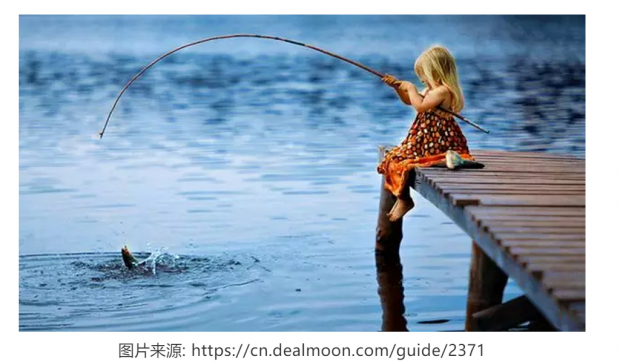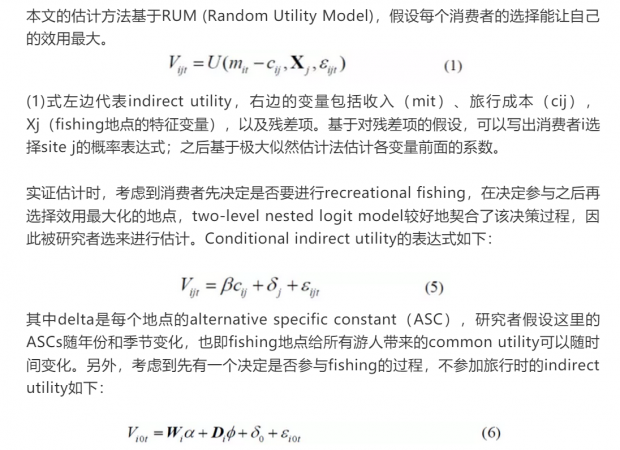阅读:0
听报道

推文人 | 邱筠
原文信息:The Effects of Weather on Recreational Fishing Demand and Adaptation: Implications for a Changing Climate, 2018, Steven J. Dundas and R.H. von Haefen, working paper.
气候变化的经济影响是目前环境经济学的热点话题。诸多研究已经从多角度估计了气候变化对农业、工业、能源使用、劳动力等方面的影响,但是将气候变化与环境价值评估结合在一起的研究非常少(虽然近年来在慢慢增加)。笔者认为有两个原因:一是估计气候变化的影响需要的数据量较大,一般的recreational demand的研究达不到其需要的数据水平;二是对环境价值评估的关注大部分来自于环境资源经济学者,与其他outcome相比,所受关注没那么高(个人猜测,欢迎指正)。今天所推文章的作者在nonmarket valuation方面都有多篇论文,这是他们对气候变化对非市场环境资源使用的影响所作的一个尝试。
背景和数据
美国人很喜欢户外运动。在水资源丰富的地区,比如海边、湖边,recreational fishing是一项特别受欢迎的活动,也因此美国的环境价值评估文献对该活动有较多研究,相关的调研数据丰富。本文估计了温度和降水对美国东部和南部海边recreational fishing的需求的影响。
研究者利用了美国recreational fishing相关的三套数据: Angler Intercept Survey、Coastal Household Telephone Survey和NOAA的fishing pressure data。Angler Intercept Survey基于fishing的地点、州、旅行方式、年份和wave进行了分层抽样,收集了与受访者的recreational fishing旅行相关的信息,比如选择的地点(site)、受访者的居住地、个人信息等变量,研究者据此计算了旅行成本。Coastal Household Telephone Survey则通过电话收集了沿海地区的居民受访前两月fishing旅行的频率、旅行地点所在的州和county等信息,Phone Survey缺少的受访者个人信息则通过American Community Survey补上。另外,NOAA的fishing pressure data in the site registry files比Intercept Survey包含更多的fishing地点,被用于更准确地估计每个fishing地点带给消费者的indirect utility。
方法


其中Wi和Di是个人/年度/wave层面的天气变量,包括温度、降水等。研究者假设,温度仅影响是否参与,但不影响选择哪个fishing地点。实际生活中,这些旅行者进行的都是短途旅行,消费者选择集合内的不同fishing 地点相距不会很远,因此短时间内这些地方的天气变量没有较大的变化。
估计过程分为三步。首先,基于Intercept Survey通过conditional logit site choice model估计旅行成本的系数和每个地点每年对所有消费者的common utility(ASCs)。这样的估计方法会导致ASCs的估计值缺乏一致性,因为Intercept Survey只抽样了部分地点,所以无法获得未被抽样地点的ASC。因此需要第二步,基于另一套包含更多fishing地点的数据(fishing pressure data),以及第一步所得的从不同county 进行fishing trips的比例,研究者对实际的不同county进行的fishing trips的占比进行了调整。小编认为第二步嵌套在第一步里面,以此获得准确的不同fishing 地点的ASCs。之后,研究者利用旅行成本和ASCs构造了在不同地点旅行对消费者的期望效用(inclusive value index)。第三步,基于Phone Survey通过discrete choice logit model估计消费者的fishing participation受到哪些因素的影响,考虑的自变量包括第二步构造的对旅行的期望效用、消费者的个人信息,以及温度和降水。最后,基于模型的估计值计算温度和降水的边际变化对应的边际支付意愿。另外很有意思的一点是,作者还根据Phone Survey单独估计了温度对于消费者是否选择在晚上进行fishing的影响,以此来检验是否存在intraday adaptation。
结论
高温对fishing参与率的影响具有强烈的区域异质性。对于Gulf和Southeast coast这些较温暖的地区,温度上升会降低fishing参与率,而对于New England和Mid-Atlantic这些较凉爽的区域,温度上升会提高fishing参与率。降水的影响同样具有区域异质性。对于Gulf coast区域的居民,降水会降低fishing的参与率,而对New England和Mid-Atlantic区域,则有相反的影响。降水与云层以及垂钓成功率高度相关,感兴趣的可以找原文看作者的解释。对夏天和非夏天的样本分别估计也获得了符合直觉的估计结果。大部分区域在非夏天的时间段平均温度仍然较低,若温度上升,fishing参与率则更高。而Gulf coast区域在非夏天也已经较热,温度上升仍然会降低fishing参与率。基于fishing活动发生在白天还是晚上,作者也发现消费者在fishing上存在intraday adaptation的现象,当温度上升,消费者更容易将活动从白天转移到晚上,而不是取消fishing。
感想
这篇论文正在环境经济学的顶级期刊上R&R。他们研究的问题对现今的中国环境未必很重要,方法也不见得能够简单复制,但笔者认为这是一项很有趣也很有意义的尝试。(1)环境价值评估和revealed preference methods的研究已经进行了许多年,研究者并未局限在自己熟悉的小领域里,而是迎合了最近越来越受关注的气候变化议题。虽然气候变化对outdoor recreation的影响未必有对其他产业的影响大,但无法否认outdoor recreation对于welfare和幸福感的重要性。(2)气候变化的经济影响的实证研究,经过多年的发展已经渐趋成熟,只估计x对一般y的causal effect越来越不够用。这篇文章给大家提供了一个开新的脑洞的思路。
注意事项:
Dr. Dundas的网站显示,本文的标题已更新为“The Effects of Weather on Recreational Fishing Demand and Adaptation: Implications for a Changing Climate”。本次推文基于较早的working paper:
。实际作者可能已对文章进行了较大修改,感兴趣的可以关注他们更新版本的论文。推文不妥之处还望海涵。
Abstract
This paper estimates the demand for coastal recreational fishing in the Atlantic and Gulf Coast regions of the United States and evaluates the potential welfare implications resulting from climate change. Specifically, we use short-run variability in temperature and precipitation to estimate the effect of weather on participation in shoreline fishing in coastal waters. We then simulate how climate change may impact those choices over time. Parameter estimates are combined with predictions from five global climate models under three emissions scenarios to estimate welfare changes associated with climate change over multiple time horizons. Overall, our results suggest the effects of climate change on shoreline recreational fishing are positive and significant in the long run (2080-2099) with simulation results predicting annual gains of up to $6.83 per trip, or $304 million in the aggregate. The results are decomposed seasonally and regionally to reveal substantial heterogeneity. Welfare gains associated with increasing temperatures in the non-summer months outweigh modest losses in the summer months. The Gulf Coast region has the potential to realize welfare losses, while the Mid-Atlantic and New England are likely to experience welfare gains in all seasons. Of the nearly 45 million annual trips predicted by the model, climate change may increase participation by 0.2 to 2.2 percent in the aggregate. Given the modest negative demand responses in the Gulf and Southeast regions, evidence of adaptation is identified from a model of night fishing. Results suggest that recreational anglers may shift their activities to night as daily high temperatures increase rather than change their participation decision.

话题:
0
推荐
财新博客版权声明:财新博客所发布文章及图片之版权属博主本人及/或相关权利人所有,未经博主及/或相关权利人单独授权,任何网站、平面媒体不得予以转载。财新网对相关媒体的网站信息内容转载授权并不包括财新博客的文章及图片。博客文章均为作者个人观点,不代表财新网的立场和观点。



 京公网安备 11010502034662号
京公网安备 11010502034662号 